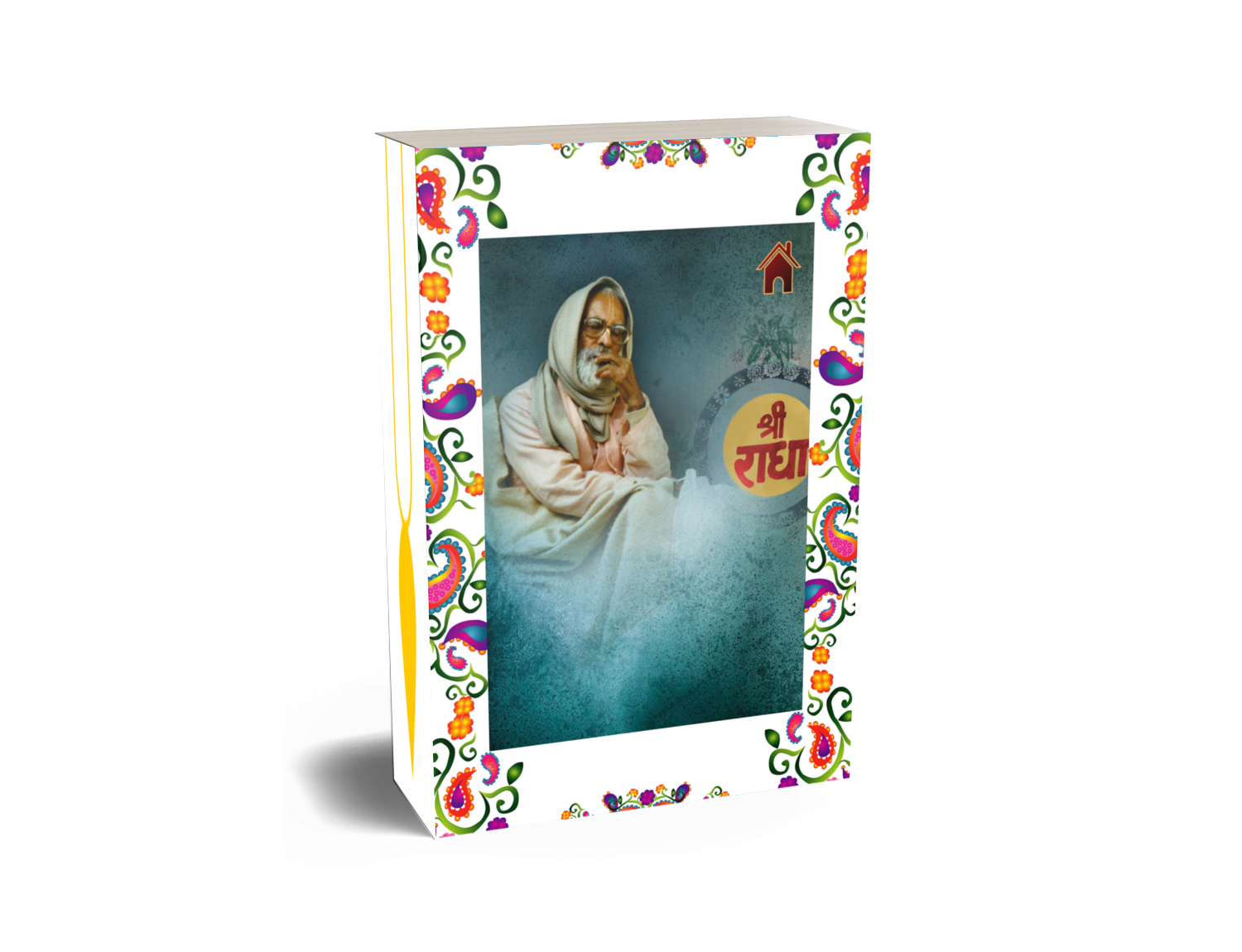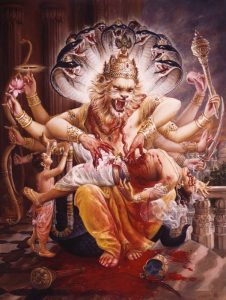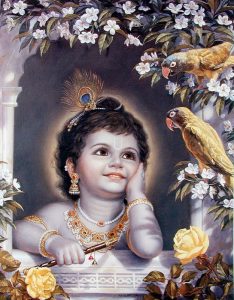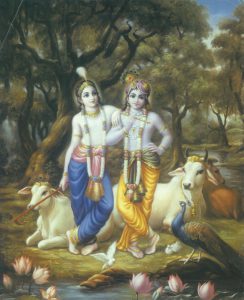

Chapter One from the book, Bhakti-rasāyana, 4th edition by Śrīla Bhaktivedānta Nārāyaṇa Mahārāja
I n the final chapter of Śrī Bṛhad-bhāgavatāmṛta, after the story of Gopa-kumāra has been  completed, Sanātana Gosvāmī quotes verses from the Tenth Canto of Śrīmad-Bhāgavatam that Parīkṣit Mahārāja spoke to his mother, Uttarā. They are verses of very beautiful poetry that stimulate the sentiment of bhakti. Stringing these verses together, Sanātana Gosvāmī has composed a necklace for the benefit of the sādhakas of this world, and when sādhakas keep these verses in their hearts, it is as if they are wearing this necklace around their necks. And if while chanting the holy name they sometimes call out these verses, it will increase the spiritual pleasure (ānanda) in their chanting. This compilation of verses is known as bhakti-rasāyana, the nectar-tonic of devotional mellows. When the material body becomes weakened by illness and one is unable to eat anything, by drinking tonic the digestion and the pulse again become strong. Similarly, in the realm of bhakti, for those in whom intense hankering for spontaneous devotion (rāgānuga-bhakti) has arisen, the verses in this final chapter are like nectar-tonic. In the mood of Kamala Mañjarī, his eternal identity within Kṛṣṇa’s pastimes, Bhaktivinoda Ṭhākura prayed:
completed, Sanātana Gosvāmī quotes verses from the Tenth Canto of Śrīmad-Bhāgavatam that Parīkṣit Mahārāja spoke to his mother, Uttarā. They are verses of very beautiful poetry that stimulate the sentiment of bhakti. Stringing these verses together, Sanātana Gosvāmī has composed a necklace for the benefit of the sādhakas of this world, and when sādhakas keep these verses in their hearts, it is as if they are wearing this necklace around their necks. And if while chanting the holy name they sometimes call out these verses, it will increase the spiritual pleasure (ānanda) in their chanting. This compilation of verses is known as bhakti-rasāyana, the nectar-tonic of devotional mellows. When the material body becomes weakened by illness and one is unable to eat anything, by drinking tonic the digestion and the pulse again become strong. Similarly, in the realm of bhakti, for those in whom intense hankering for spontaneous devotion (rāgānuga-bhakti) has arisen, the verses in this final chapter are like nectar-tonic. In the mood of Kamala Mañjarī, his eternal identity within Kṛṣṇa’s pastimes, Bhaktivinoda Ṭhākura prayed:
nāhaṁ vande tava caraṇayor dvandvam advandva-hetoḥ
kumbhī-pākaṁ gurum api hare nārakaṁ nāpanetum
ramyā-rāmā-mṛdu-tanu-latā-nandane nābhirantuṁ
bhāve bhāve hṛdaya-bhavane bhāvayeyaṁ bhavantam
“O Lord, I am not performing bhajana so that You will remove the worldly misery that is strangling me. I am not praying at Your feet for entrance into the heavenly garden of Nandana-kānana where one can enjoy with beautiful women for a very long time, nor am I praying for liberation so that I will never again have to suffer for nine  months in the womb of a mother and never again be punished by the messengers of Yamarāja. I pray that in the core of my heart You will increase the bhāva of Vṛndāvana, where You are roaming with the gopīs and enjoying amorous pastimes. In meditation on the descriptions of these pastimes, I will at once become completely lost in prema – this is what I am praying for. I am praying that I may take birth as a gopa or gopī, or even as a peacock or tree or anything, anywhere within the sixty-four square-mile Vraja-maṇḍala. There I will acquire the company of a rasika devotee who, being full of the bhāva of Vṛndāvana, will describe all of these pastimes to me, and then my life will be meaningful.”
months in the womb of a mother and never again be punished by the messengers of Yamarāja. I pray that in the core of my heart You will increase the bhāva of Vṛndāvana, where You are roaming with the gopīs and enjoying amorous pastimes. In meditation on the descriptions of these pastimes, I will at once become completely lost in prema – this is what I am praying for. I am praying that I may take birth as a gopa or gopī, or even as a peacock or tree or anything, anywhere within the sixty-four square-mile Vraja-maṇḍala. There I will acquire the company of a rasika devotee who, being full of the bhāva of Vṛndāvana, will describe all of these pastimes to me, and then my life will be meaningful.”
When sādhakas study and learn these verses, deeply meditating within themselves on their meanings while chanting the holy name, they will act as stimuli to fully experience the mood described in the verse above. Then one’s mind will not wander here and there. We should not just walk around talking to others while chanting, but taking our chanting beads we should sit in a solitary place and give it our mind and heart. Our previous ācāryas chanted all night long, meditating on one verse after another. For half an hour the waves of the bhāva of one particular verse would be coming to them: sometimes they would be fully submerged in those waves, sometimes they would rise to the surface and float on those waves, and then they would move on to the next verse. As they did this more and more the whole night would pass, and where it went, they wouldn’t know. This is the traditional method of performing bhajana.
Through these verses Parīkṣit Mahārāja is making the bhakti of his mother steady and strengthening her determination for gopī-bhāva, and through these same verses Sanātana Gosvāmī is nurturing us. There is a blend of so many different bhāvas in Vṛndāvana, but in the end, applying some polish to these sentiments, he emphasises gopī-bhāva. There are many verses here, and they are all beneficial to the cultivation of bhajana. To develop and strengthen this bhāva within us, we will study these verses in sequence, and from this endeavour intense hankering for this particular devotional sentiment will certainly arise within us.
dhanyeyam adya dharaṇī tṛṇa-vīrudhas tvat-
pāda-spṛśo druma-latāḥ karajābhimṛṣṭāḥ
nadyo ’drayaḥ khaga-mṛgāḥ sadayāvalokair
gopyo ’ntareṇa bhujayor api yat-spṛhā śrīḥ
Śrīmad-Bhāgavatam (10.15.8); Bṛhad-bhāgavatāmṛta (2.7.107)
[Śrī Kṛṣṇa said to Balarāma:] Today this land, along with all its green grass, has become fortunate due to receiving the touch of your lotus feet. And receiving the touch of the fingers of your lotus hands, the trees, creepers and bushes consider that they have attained the greatest treasure. Receiving your affectionate glances, the rivers, mountains, birds and animals are all feeling fully gratified. But most fortunate of all are the vraja-gopīs, who have been embraced to Your strong chest, a favour that even Lakṣmī-devī herself always desires.
This verse describes the time when Kṛṣṇa is at the junction of His paugaṇḍa-līlā (ages six to ten) and kaiśora-līlā (ages ten to sixteen). At this time His full beauty and charm are becoming more apparent, and His limbs are filling out. He would feel shy if He were to remain naked at this age. Now He enjoys taking the cows out to graze, and jumping about and creating mischief with His friends. At this age His form is like a bud that is beginning to  open; it has not yet become a flower, but it is gradually opening and becoming more charming. Previously no fragrance came from the bud, and no bee would have been hovering around it. But as it opens more and more, the fragrance begins to come and there is nectar available to the bee. When it spreads out and becomes fully mature, it means that Kṛṣṇa has reached the kaiśora age. Now that Kṛṣṇa and Baladeva have become a little older, their forms have become very charming. Their feet have also become bigger; previously they were thin from heel to toe, but now like ripe bananas their feet have become big and very soft, and whereas before the soles of their feet had yellowish complexions, now they have begun to take on a reddish hue. Now Kṛṣṇa has become a little clever in speaking; instead of always speaking directly, He has learned to speak in a roundabout way. These are all symptoms of this age.
open; it has not yet become a flower, but it is gradually opening and becoming more charming. Previously no fragrance came from the bud, and no bee would have been hovering around it. But as it opens more and more, the fragrance begins to come and there is nectar available to the bee. When it spreads out and becomes fully mature, it means that Kṛṣṇa has reached the kaiśora age. Now that Kṛṣṇa and Baladeva have become a little older, their forms have become very charming. Their feet have also become bigger; previously they were thin from heel to toe, but now like ripe bananas their feet have become big and very soft, and whereas before the soles of their feet had yellowish complexions, now they have begun to take on a reddish hue. Now Kṛṣṇa has become a little clever in speaking; instead of always speaking directly, He has learned to speak in a roundabout way. These are all symptoms of this age.
His newfound cleverness in speech is evident in His speaking of this verse. To avoid praising Himself, He uses the presence of Baladeva Prabhu as a pretext to express His feelings. Because at this age He has “become” a little intelligent, He realises that He should never praise Himself; praising oneself is like committing suicide. Here He wants to describe how Vṛndāvana is more glorious than any place within the three worlds, and even more glorious than Vaikuṇṭha. He begins by saying that the Earth is fortunate. Why is the Earth fortunate? Because of the presence of India. Why is India so glorious? Because of the presence of Vṛndāvana. And why is Vṛndāvana so glorious? Because of the presence of the gopas and gopīs. Why are the gopas and gopīs glorious? Because amongst them are Kṛṣṇa and Rādhā. And why are They glorious? Because of the mutual prema between Them, and that is our highest objective. If not for the amorous love of Śrī Rādhā and Kṛṣṇa, then all of our endeavours would be meaningless. It is prayed for again and again by the topmost devotees, and Rādhā’s prema is so glorious that it overpowers Kṛṣṇa Himself.
But He doesn’t describe all of this directly by saying, “I am the supreme ornament that beautifies Vṛndāvana.” Because He is now entering His kaiśora age, when speaking He knows how to keep this feeling hidden and how to skilfully reveal it.
Together Kṛṣṇa and Balarāma are taking the cows out to graze, and upon seeing the beauty and splendour of the Vṛndāvana forest, at once Kṛṣṇa becomes overwhelmed with emotion. What is the meaning of “Vṛndāvana”? It means the forest of vṛndā, or tulasī. There are many other wonderful trees and plants found there, but the tulasī tree is primary. It can also mean the forest where the cowherd girl Vṛndā-devī is queen. Why is she known as the queen of Vṛndāvana? Because she arranges amorous meetings between Śrī Rādhā and Kṛṣṇa. Another meaning of vṛndā is “group”, meaning groups of cows, gopas and gopīs, and avana can mean “one who nourishes and protects”. So Vṛndāvana can also mean the ones who provide stimuli that nurture and increase feelings of love in Śrī Govinda and the cows, gopas and gopīs. More meanings have been given, but these three are primary.
As Kṛṣṇa was speaking this verse, He was remembering His own pastimes, and waves of bhāva began to flow  inside Him. As He was going along with His friends, the joy He felt knew no limits, and He said, “My dear brother, today Pṛthivī-devī (the Earth) has become fortunate, and the hairs of her body, which are the grass, creepers, vines and trees, are standing on end in ecstatic rapture. The grass, creepers and vines, receiving the touch of Your lotus feet, and the trees, being touched by Your hands as you pick fruits and flowers, have today become fully gratified. And the rivers, mountains, birds, deer and all other animals, receiving affectionate glances from You, have today become especially fortunate. But the most fortunate of all are the gopīs, who have received what even Lakṣmī-devī herself desires – being embraced between your two strong arms.”
inside Him. As He was going along with His friends, the joy He felt knew no limits, and He said, “My dear brother, today Pṛthivī-devī (the Earth) has become fortunate, and the hairs of her body, which are the grass, creepers, vines and trees, are standing on end in ecstatic rapture. The grass, creepers and vines, receiving the touch of Your lotus feet, and the trees, being touched by Your hands as you pick fruits and flowers, have today become fully gratified. And the rivers, mountains, birds, deer and all other animals, receiving affectionate glances from You, have today become especially fortunate. But the most fortunate of all are the gopīs, who have received what even Lakṣmī-devī herself desires – being embraced between your two strong arms.”
From the very beginning of creation, Pṛthivī-devī has been serving Bhagavān. Whenever he desired to assume an incarnation, he would descend on this Earth and grace the land with his footprints. Varāha held the Earth on his snout, and at that time Pṛthivī-devī became his wife, and from them a son, Narakāsura, was born. And the Earth is always in contact with the Lord’s form of Śeṣa as he holds her on his head. From time immemorial she has been receiving such good opportunities, but Kṛṣṇa tells Balarāma, “Today, by receiving the touch of your feet, the Earth has become especially fortunate. Why? Because you are now at the junction of your paugaṇḍa and kaiśora ages and your lotus feet are especially soft, and such a nice fragrance is coming from them. You move along the Earth like an intoxicated baby elephant. Has the Earth ever received such an opportunity before? Today the Earth has really become fortunate.”
Here someone may point out that at that time Kṛṣṇa had been in contact with the Vṛndāvana forest for only ten- and-a-half years, whereas Śrī Rāmacandra wandered in the forest of Dandakaranya for fourteen years. In bare feet he also walked the entire distance to South India before entering Lanka, so did Pṛthivī-devī not become as fortunate then as she did during Kṛṣṇa-līlā? But Rāma was banished to the forest, and when in the last year of his exile Rāvaṇa kidnapped Sītā, he wandered here and there crying in anguish. Therefore at that time Pṛthivī-devī certainly became fortunate from the touch of his feet, but she must have also felt very sad. She really became fortunate when Kṛṣṇa came in an immensely beautiful form; with a peacock feather in His crown, He would smile as He was decorated by His mother in the morning, and then, accompanied by Śrīdāmā and Subala and the other sakhās, He would take the cows out to graze and jump about with the calves. Just as the young offspring of a deer playfully jump about, He would go along with all of His friends with a happy heart. Picking flowers with their own hands, they would make garlands and decorate each other, and arriving at places like Kusuma-sarovara, Rādhā-kuṇḍa and Śyāma-kuṇḍa, they would enjoy pastimes that were saturated with rasa. With special care Kṛṣṇa would string one garland that was not meant for any of the sakhās, and feeling great happiness as He thought of whom He would place this garland on, He tucked it away. Who can estimate the great good fortune of those flowers, being picked and made into a garland by Kṛṣṇa’s own beautiful hands? When in the evening He would place that garland on a certain devotee, He would feel supremely blissful. Did any of this happen in rāma-līlā? There was constant heartbreak in Rāmacandra’s pastimes, but in contrast in Kṛṣṇa-līlā there was so much carefree happiness.
and-a-half years, whereas Śrī Rāmacandra wandered in the forest of Dandakaranya for fourteen years. In bare feet he also walked the entire distance to South India before entering Lanka, so did Pṛthivī-devī not become as fortunate then as she did during Kṛṣṇa-līlā? But Rāma was banished to the forest, and when in the last year of his exile Rāvaṇa kidnapped Sītā, he wandered here and there crying in anguish. Therefore at that time Pṛthivī-devī certainly became fortunate from the touch of his feet, but she must have also felt very sad. She really became fortunate when Kṛṣṇa came in an immensely beautiful form; with a peacock feather in His crown, He would smile as He was decorated by His mother in the morning, and then, accompanied by Śrīdāmā and Subala and the other sakhās, He would take the cows out to graze and jump about with the calves. Just as the young offspring of a deer playfully jump about, He would go along with all of His friends with a happy heart. Picking flowers with their own hands, they would make garlands and decorate each other, and arriving at places like Kusuma-sarovara, Rādhā-kuṇḍa and Śyāma-kuṇḍa, they would enjoy pastimes that were saturated with rasa. With special care Kṛṣṇa would string one garland that was not meant for any of the sakhās, and feeling great happiness as He thought of whom He would place this garland on, He tucked it away. Who can estimate the great good fortune of those flowers, being picked and made into a garland by Kṛṣṇa’s own beautiful hands? When in the evening He would place that garland on a certain devotee, He would feel supremely blissful. Did any of this happen in rāma-līlā? There was constant heartbreak in Rāmacandra’s pastimes, but in contrast in Kṛṣṇa-līlā there was so much carefree happiness.
In the same way as we may caress one person whom we love and lovingly slap another, Bhagavān has  touched the Earth in different ways in his different incarnations. Rāmacandra touched the Earth, and Nṛsiṁhadeva also touched the Earth. Assuming a fearful form, Nṛsiṁhadeva appeared, and being extremely angry he killed Hiraṇyakaśipu. All of the residents of the heavenly and lower planetary systems were petrified with fear, and at that time the Earth did not experience great pleasure. But when Kṛṣṇa touched the Earth in such a beautiful form, she really became fortunate.
touched the Earth in different ways in his different incarnations. Rāmacandra touched the Earth, and Nṛsiṁhadeva also touched the Earth. Assuming a fearful form, Nṛsiṁhadeva appeared, and being extremely angry he killed Hiraṇyakaśipu. All of the residents of the heavenly and lower planetary systems were petrified with fear, and at that time the Earth did not experience great pleasure. But when Kṛṣṇa touched the Earth in such a beautiful form, she really became fortunate.
The rivers, especially the Yamunā, also became fortunate. At that time Mānasī-gaṅgā was also a river, though now it is in the form of a pond, and it also became fortunate. He would lovingly glance towards the rivers because there He would sport with the gopīs and sakhās. The rivers would make a sweet sound as they flowed gently, and bees would be hovering around the blooming lotuses. The soft breeze would carry the fragrance, and the entire scene would be so beautiful. Through the bestowal of His affectionate glances, He would also shower the nectar of His kindness upon the hills and mountains, because near them were very attractive kuñjas where there would be very beautiful grass, and on the pretext of taking the cows to graze He would go there. Sitting on the large rocks with His friends, they would decorate one another. These kuñjas, such as the ones near Kusuma-sarovara, were very beautiful, and there He would enjoy with the gopīs as well.
This verse describes four benedictions: receiving Kṛṣṇa’s affectionate glances, receiving the touch of His feet, receiving the touch of His hands and being embraced by His arms, as the gopīs were. When Kṛṣṇa would be taking the cows out to graze, from hidden positions the gopīs would lovingly glance at Him, and then He would glance towards them with such affection that it would immerse them in remembrance of His sweetness. In the  same way He would glance towards the different birds and animals, and from this they also became fortunate. Sometimes a peacock, being maddened in bhāva, would come near Him, and He would gently stroke it with His hand. Sometimes He would call a parrot, and when it flew onto His hand, while stroking it gently He would teach it to speak and then listen to what the parrot said back. The calves would also receive the touch of His hands. Very young calves – perhaps only a few days old – forgetting the company of their mothers, would jump along as they accompanied Kṛṣṇa to the forest. As they proceeded further and further, they would become fatigued, so Kṛṣṇa would take them on His lap and massage their legs, and with great love He would speak sweet words to them. Tell me – how much good fortune did those calves possess? He would also take the sakhās on His lap and stroke them, and in this way Subala and others received the touch of His hands. Considering the diverse sentiments of the residents of Vṛndāvana, He touches them in different ways. When Kṛṣṇa takes the cows and His friends to drink from and sport in the rivers, the rivers have one type of sentiment, and when He goes there with the gopīs, they have a different type of bhāva. Receiving the touch of Kṛṣṇa’s feet, the rivers swell in spiritual ecstasy. The trees have the sentiment of sakhās, and they receive the touch of both His hands and feet. The cows have the sentiment of being His mother, and the calves have the sentiment of sakhās. The creepers have the devotional feelings of sakhīs, and when He picks flowers from them, it is as if He is teasing a gopī with His touch. The gopīs also receive the touch of Kṛṣṇa’s lotus feet:
same way He would glance towards the different birds and animals, and from this they also became fortunate. Sometimes a peacock, being maddened in bhāva, would come near Him, and He would gently stroke it with His hand. Sometimes He would call a parrot, and when it flew onto His hand, while stroking it gently He would teach it to speak and then listen to what the parrot said back. The calves would also receive the touch of His hands. Very young calves – perhaps only a few days old – forgetting the company of their mothers, would jump along as they accompanied Kṛṣṇa to the forest. As they proceeded further and further, they would become fatigued, so Kṛṣṇa would take them on His lap and massage their legs, and with great love He would speak sweet words to them. Tell me – how much good fortune did those calves possess? He would also take the sakhās on His lap and stroke them, and in this way Subala and others received the touch of His hands. Considering the diverse sentiments of the residents of Vṛndāvana, He touches them in different ways. When Kṛṣṇa takes the cows and His friends to drink from and sport in the rivers, the rivers have one type of sentiment, and when He goes there with the gopīs, they have a different type of bhāva. Receiving the touch of Kṛṣṇa’s feet, the rivers swell in spiritual ecstasy. The trees have the sentiment of sakhās, and they receive the touch of both His hands and feet. The cows have the sentiment of being His mother, and the calves have the sentiment of sakhās. The creepers have the devotional feelings of sakhīs, and when He picks flowers from them, it is as if He is teasing a gopī with His touch. The gopīs also receive the touch of Kṛṣṇa’s lotus feet:
yat te sujāta-caraṇāmburuhaṁ staneṣu
bhītāḥ śanaiḥ priya dadhīmahi karkaśeṣu
tenāṭavīm aṭasi tad vyathate na kiṁ svit
kūrpādibhir bhramati dhīr bhavad-āyuṣāṁ naḥ
Śrīmad-Bhāgavatam (10.31.19)
[The gopīs said:] O dear one, Your lotus feet are so soft that we place them gently on our breasts, fearing that they will be harmed. Our life rests only in You, and therefore our minds are filled with anxiety that Your tender feet might be wounded by pebbles as You roam about on the forest path.
The gopīs are arguing with their own minds. Their minds are saying to them, “Why are you worrying about Kṛṣṇa? There is no necessity.”
But from deep within their hearts, from their very souls, the gopīs reply, “We are upset because Kṛṣṇa’s feet are very soft, and we are afraid that they will be pricked by thorns and pebbles. We desire that He should never feel any pain.”
“Is Kṛṣṇa blind? He has eyes, doesn’t He? He can see where to place His feet while walking.”
“O mind, the calves run here and there, and do they only go to safe and smooth places? They run near the mountains, rivers and jungles, and they also have hooves that protect them from sharp objects. But if Kṛṣṇa goes to such places, His feet will be burned by the hot sand or pricked by thorns and pebbles. O mind, you have no intelligence!”
“But in Vṛndāvana there are no such thorns and pebbles. Everything here is viśuddha-sattva. They appear to be ordinary thorns, but it is as if they are made of rubber. Will rubber thorns prick your feet? They give a very soft touch to Kṛṣṇa’s tender feet when He steps on them. And the pebbles are softer than butter! By the influence of viśuddha-sattva, Pṛthivī-devī has decorated her landscape with these soft and golden pebbles so Kṛṣṇa will never feel any pain.”
In this way they were arguing with their minds. The gopīs received the touch of those feet in the rāsa dance, a benediction that even Lakṣmī-devī desires, and Brahmā is also always meditating on those feet:
āhuś ca te nalina-nābha padāravindaṁ
yogeśvarair hṛdi vicintyam agādha-bodhaiḥ
Śrīmad-Bhāgavatam (10.82.48)
Such great storehouses of knowledge as Lord Brahmā, Lord Śiva, the Kumāras and Śukadeva Gosvāmī are always trying to remember Kṛṣṇa’s lotus feet, but only with great difficulty do those feet appear in their meditation. Responding to Kṛṣṇa’s teasing with jealous anger, the gopīs say, “You have instructed us to meditate, but a realisation of You rarely comes even in the meditation of the most highly learned devotees! We want You to come back to Vṛndāvana. And those feet that are being meditated on by so many – we desire to play with them directly. What to speak of holding them within our brains in meditation, we desire to hold them close to us. Meditation will not satisfy us, so we won’t do it!”
They desire to receive the touch of His feet while they are decorating Him, and then they will also receive the touch of His hands. And in the end they will receive the benediction of being embraced between His two strong arms. Kṛṣṇa will be touching their feet also, when they exhibit jealous anger (māna) and He is trying to appease  them. Then everything is reversed, and Lakṣmī also desires all of this.
them. Then everything is reversed, and Lakṣmī also desires all of this.
So in this verse, when Kṛṣṇa says, “My dear brother, today the Earth has become glorious,” He is simply using the presence of Baladeva Prabhu as a pretext so that the sweetness of Kṛṣṇa Himself, the sweetness of the gopīs, and the glories of Vṛndāvana can all be specifically described. And why has Vṛndāvana become glorious? Because in that place the grass and creepers received the touch of Kṛṣṇa’s feet, its vines and trees received the touch of His hands, and its rivers, mountains, birds and animals received His affectionate glances. But above all Vṛndāvana is especially glorious because of the presence of the gopīs, whom Kṛṣṇa Himself serves.
Image/Art made possible by Pixabay.com & Krishnapath.org








